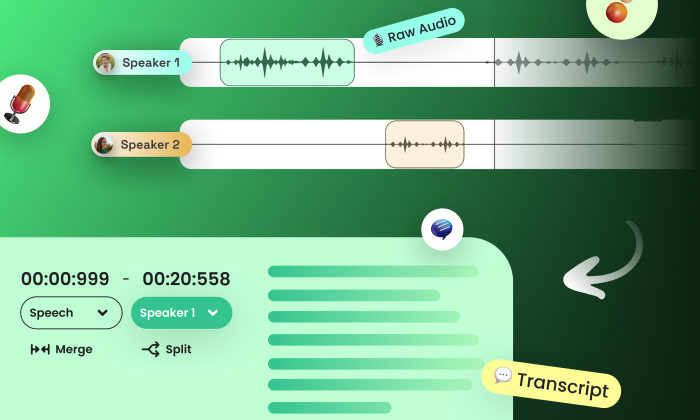What is speaker diversity and why does it matter in training data?
Data Diversity
AI Ethics
Speech AI
Speaker diversity in AI training data refers to the inclusion of a wide range of demographic and linguistic characteristics among speakers within a dataset. This diversity includes variables such as age, gender, ethnicity, regional accents, and socio-economic backgrounds. It is especially crucial in developing AI systems focused on speech recognition and synthesis, ensuring they can effectively understand and replicate human speech in a variety of real-world contexts.
The Importance of Speaker Diversity in AI Model Training
- Enhancing model robustness: Training AI models with diverse datasets enhances their robustness, enabling them to handle the variability of real-world speech. For instance, an automatic speech recognition (ASR) system trained with data from a narrow demographic might struggle to accurately process voices from other backgrounds. This limitation can lead to higher error rates and user dissatisfaction. A diverse dataset ensures that the model can maintain high accuracy across different demographics.
- Bias mitigation in AI: AI models, when trained predominantly on a specific set of voices, can inadvertently favor those speech patterns, leading to biased outcomes. This bias poses ethical concerns and operational inefficiencies. By incorporating a broad range of speakers, AI systems can mitigate these biases, ensuring fairness and equitable treatment across diverse user groups. This is particularly crucial in applications like virtual assistants, where equitable user experience is paramount.
- Improving user experience in AI: For speech technology applications such as virtual assistants, customer service bots, and voice-activated systems, user experience is crucial. AI systems that recognize and respond accurately to a wide array of speakers create a sense of inclusivity and understanding among users. This is vital for companies targeting diverse or global markets. Systems that efficiently process various accents and speech styles without compromising performance are more likely to gain user trust and adoption.
Implementing Speaker Diversity
Diverse data collection methods
To achieve meaningful speaker diversity, targeted data collection strategies are essential. FutureBeeAI, through its Yugo platform, exemplifies effective methods by:
- Sourcing diverse contributors: Engaging speakers from various backgrounds, ensuring representation across demographics. Yugo facilitates this by streamlining the onboarding of contributors from multiple regions and cultures.
- Considering geographic and cultural factors: Collecting data that captures different regional accents and dialects is crucial. For multilingual markets, this means including speakers from various linguistic backgrounds.
- Ensuring age and gender representation: Including voices from different age groups and genders is essential. This can involve setting quotas to balance male and female voices, ensuring datasets reflect societal diversity.
Annotation and quality assurance
Speaker diversity extends beyond collection into the annotation and quality control phase:
- Speaker diarization: Labeling and differentiating between speakers in conversations helps AI models grasp dialogue nuances.
- Emotion and intent tagging: Adding contextual information aids models in understanding not only the words but also the tone and intent behind them.
Navigating the Trade-Offs
- Data volume vs. diversity: One challenge in implementing speaker diversity is balancing data volume with diversity. Collecting a diverse set of speakers might result in smaller datasets, potentially affecting model performance. Teams can use data augmentation techniques to expand datasets while maintaining diversity.
- Cost and resource considerations: Diverse data collection can be resource-intensive, requiring significant time and budget. Organizations must weigh the benefits of improved model performance and user satisfaction against the costs of sourcing and annotating diverse datasets.
Common Missteps in AI Teams
Despite the importance of speaker diversity, teams often make critical errors:
- Overlooking subtle variations: Teams might focus on overt differences like gender or accent while neglecting factors such as socio-economic backgrounds or less visible disabilities. These oversights can result in incomplete datasets that fail to meet all user needs.
- Ignoring user feedback: Failing to incorporate user feedback on speech technology experiences can lead to persistent biases. Regular updates based on user interactions are vital for maintaining relevance and efficacy.
- Assuming one-size-fits-all: Believing a single diverse dataset can serve all markets equally is a mistake. Different applications may need tailored datasets that reflect specific audience characteristics.
Real-World Impact and FutureBeeAI's Role
Organizations that prioritize speaker diversity can build more robust, equitable, and user-friendly AI systems, leading to better performance and user satisfaction globally. FutureBeeAI plays a pivotal role in this process by providing high-quality, diverse datasets and expert services in data collection and annotation. For companies seeking to enhance their AI systems with diverse speech data, FutureBeeAI offers a smart, scalable partnership to achieve these goals.
FAQs
Q. How does speaker diversity improve AI model performance?
A. Speaker diversity enhances AI models by increasing their ability to understand and generate speech across different accents, dialects, and patterns, leading to lower error rates and improved user satisfaction.
Q. What specific strategies ensure speaker diversity in datasets?
A. Organizations can ensure diversity by sourcing contributors from a range of demographics, focusing on geographic and cultural representation, and employing quotas for age and gender balance. Platforms like FutureBeeAI's Yugo streamline these efforts.
What Else Do People Ask?
Related AI Articles
Browse Matching Datasets
Acquiring high-quality AI datasets has never been easier!!!
Get in touch with our AI data expert now!








